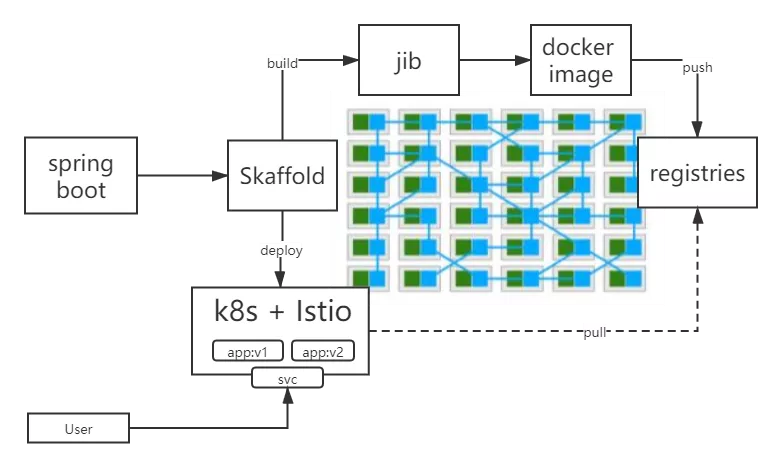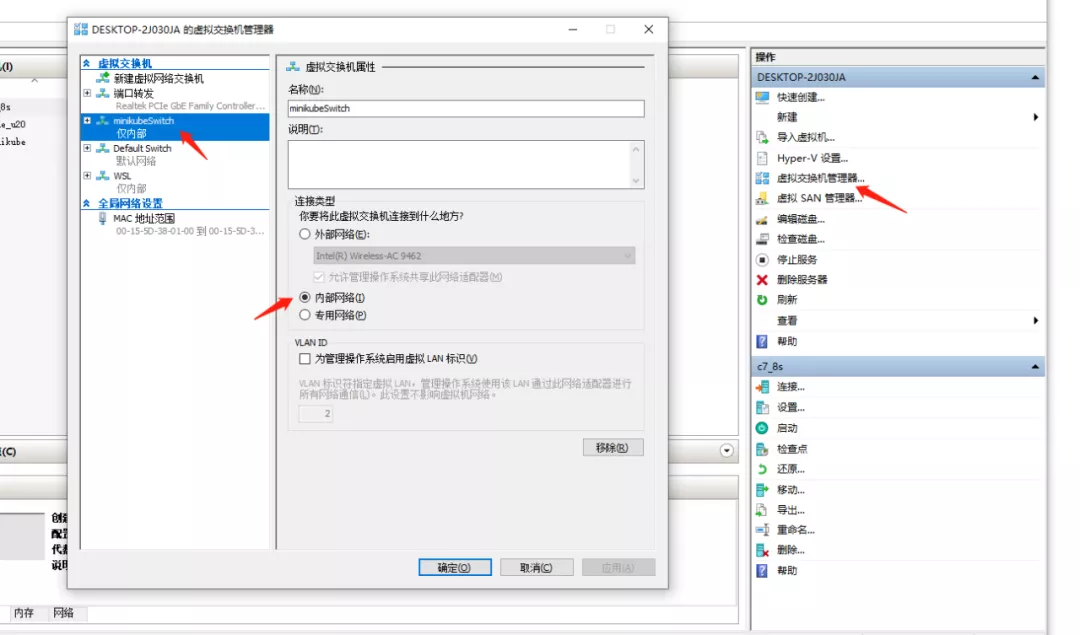
你会不会对“云原生”很有兴趣,却不知道从何入手?
本文会在window环境下,构建一套基于k8s的istio环境,并且通过skaffold完成镜像的构建和项目部署到集群环境。其实对于实验环境有限的朋友们,完全可以在某里云上,按量付费搞3台”突发性能实例“,玩一晚,也就是杯咖啡钱。
好吧,让我开始吧!
执行流程
整体流程的话,如下图所示,通过 Skaffold+jib 将开发的应用打包成镜像,提交到本地仓库,并且将应用部署到集群中。k8s中部署2个pod,模拟应用不同的版本,并且配置访问权重20%:80%。

环境选择
我之前有文章详细介绍过minikube。本次实验,开始的时候,我就一直沉溺在使用kind的便捷上,而且直接可以在docker上部署集群,可以说非常方便。但是由于我对K8S的理解并不足够,导致后面遇到了很多问题,所以,在这里建议新上手的小伙伴,还是使用minikube吧。k3s和RKE都需要多台虚拟机,碍于机器性能,这种方案暂时不考虑了。
下面表格,对比了minikube、kind、k3s 部署环境,以及支持情况,方便大家选择。
minikube | kind | k3s | |
|---|---|---|---|
runtime | VM | container | native |
supported architectures | AMD64 | AMD64 | AMD64, ARMv7, ARM64 |
supported container runtimes | Docker,CRI-O,containerd,gvisor | Docker | Docker, containerd |
startup time initial/following | 5:19 / 3:15 | 2:48 / 1:06 | 0:15 / 0:15 |
memory requirements | 2GB | 8GB (Windows, MacOS) | 512 MB |
requires root? | no | no | yes (rootless is experimental) |
multi-cluster support | yes | yes | no (can be achieved using containers) |
multi-node support | no | yes | yes |
project page | https://minikube.sigs.k8s.io/ | https://kind.sigs.k8s.io/ | https://k3s.io/ |
[1] 表格引用自:http://jiagoushi.pro/minikube-vs-kind-vs-k3s-what-should-i-use
docker desktop 没有特殊要求。其他的自己用的顺手就好,还是需要特别说一下minikube,别用最新的coredns一直都拉不下来,除非你的魔法,可以完全搞定,否则,还是用阿里编译的minikube版本吧,别跟自己较劲,别问我为什么...
我用的版本罗列在下面了:
➜ ~ istioctl version client version: 1.10.2 control plane version: 1.10.2 data plane version: 1.10.2 (10 proxies)➜ ~ minikube version
minikube version: v1.18.1
commit: 511aca80987826051cf1c6527c3da706925f7909
➜ ~ skaffold version
v1.29.0
环境搭建
使用minikube创建集群
使用 hyperv 作为引擎 , 内存 8192M cup 4核,不能再少了,否则拉不起来 istio
➜ ~ minikube start --image-mirror-country='cn' --registry-mirror=https://hq0igpc0.mirror.aliyuncs.com --vm-driver="hyperv" --memory=8192 --cpus=4 --hyperv-virtual-switch="minikubeSwitch" --image-repository=registry.cn-hangzhou.aliyuncs.com/google_containers还要在 hyperv里创建一个虚拟路由,这里我构建了一个内部网络,这样可以通过设置网卡的ip,将内部网络的网段固定下来,否则,每次重启都会变化ip

配置让内部网络,共享访问互联网
启动成功
➜ istio-1.10.2 minikube start 😄 Microsoft Windows 10 Pro 10.0.19042 Build 19042 上的 minikube v1.18.1 🎉 minikube 1.20.0 is available! Download it: https://github.com/kubernetes/minikube/releases/tag/v1.20.0
✨ 根据现有的配置文件使用 hyperv 驱动程序
👍 Starting control plane node minikube in cluster minikube
🔄 Restarting existing hyperv VM for "minikube" ...
🐳 正在 Docker 20.10.3 中准备 Kubernetes v1.20.2…
🔎 Verifying Kubernetes components...
▪ Using image registry.cn-hangzhou.aliyuncs.com/google_containers/storage-provisioner:v4 (global image repository)
▪ Using image registry.hub.docker.com/kubernetesui/dashboard:v2.1.0
▪ Using image registry.hub.docker.com/kubernetesui/metrics-scraper:v1.0.4
▪ Using image registry.cn-hangzhou.aliyuncs.com/google_containers/metrics-server-amd64:v0.2.1 (global image repository)
🌟 Enabled addons: metrics-server, storage-provisioner, dashboard, default-storageclass
🏄 Done! kubectl is now configured to use "minikube" cluster and "default" namespace by default
部署 istio
创建 istio-system 的命名空间
kubectl create namespace istio-system
安装 istio
istioctl manifest apply --set profile=demo
安装完成后,执行命令 kubectl get svc -n istio-system
➜ ~ kubectl get svc -n istio-system
NAME TYPE CLUSTER-IP EXTERNAL-IP PORT(S) AGE
istio-egressgateway ClusterIP 10.105.31.73 <none> 80/TCP,443/TCP 8d
istio-ingressgateway LoadBalancer 10.103.61.73 <pending> 15021:31031/TCP,80:31769/TCP,443:30373/TCP,31400:31833/TCP,15443:32411/TCP 8d
istiod ClusterIP 10.110.109.205 <none> 15010/TCP,15012/TCP,443/TCP,15014/TCP 8d部署 bookinfo
部署 bookinfo demo 验证环境
执行命令
kubectl label namespace default istio-injection=enabled
kubectl apply -f samples/bookinfo/platform/kube/bookinfo.yaml
等待pod都启动起来以后,添加bookinfo网络配置,用于访问 kubectl apply -f .\samples\bookinfo\networking\bookinfo-gateway.yaml
➜ istio-1.10.2 kubectl apply -f .\samples\bookinfo\networking\bookinfo-gateway.yamlgateway.networking.istio.io/bookinfo-gateway created
virtualservice.networking.istio.io/bookinfo created
使用命令查看service : kubectl get services
➜ ~ kubectl get services
NAME TYPE CLUSTER-IP EXTERNAL-IP PORT(S) AGE
callme-service NodePort 10.106.26.24 <none> 8080:30101/TCP 8d
details ClusterIP 10.110.253.19 <none> 9080/TCP 8d
kubernetes ClusterIP 10.96.0.1 <none> 443/TCP 8d
productpage ClusterIP 10.96.246.175 <none> 9080/TCP 8d
ratings ClusterIP 10.99.234.109 <none> 9080/TCP 8d
reviews ClusterIP 10.103.177.123 <none> 9080/TCP 8d查看pods状态 kubectl get pods
➜ ~ kubectl get pods
NAME READY STATUS RESTARTS AGE
callme-service-v1-76dd76ddcc-znb62 2/2 Running 0 4h59m
callme-service-v2-679db76bbc-m4svm 2/2 Running 0 4h59m
details-v1-79f774bdb9-qk9q8 2/2 Running 8 8d
productpage-v1-6b746f74dc-p4xcb 2/2 Running 8 8d
ratings-v1-b6994bb9-dlvjm 2/2 Running 8 8d
reviews-v1-545db77b95-sgdzq 2/2 Running 8 8d
reviews-v2-7bf8c9648f-t6s8z 2/2 Running 8 8d
reviews-v3-84779c7bbc-4p8hv 2/2 Running 8 8d查看集群ip 以及 端口
➜ ~ kubectl get po -l istio=ingressgateway -n istio-system -o 'jsonpath={.items[0].status.hostIP}'
192.168.137.115➜ istio-1.10.2 kubectl get svc istio-ingressgateway -n istio-system
NAME TYPE CLUSTER-IP EXTERNAL-IP PORT(S) AGE
istio-ingressgateway LoadBalancer 10.110.228.32 <pending> 15021:32343/TCP,80:30088/TCP,443:31869/TCP,31400:32308/TCP,15443:32213/TCP 3m17s
于是访问地址: http://192.168.137.115/productpage
我们 bookinfo 就部署成功了。接下来我们创建应用
构建应用
构建一个普通的springboot工程,添加编译插件,这里我们使用了本地的docker仓库存储镜像
<build>
<plugins>
<plugin>
<groupId>org.springframework.boot</groupId>
<artifactId>spring-boot-maven-plugin</artifactId>
<executions>
<execution>
<goals>
<goal>build-info</goal>
<goal>repackage</goal>
</goals>
</execution>
</executions>
</plugin>
<plugin>
<groupId>com.google.cloud.tools</groupId>
<artifactId>jib-maven-plugin</artifactId>
<version>3.1.1</version>
<configuration>
<to>
<image>127.0.0.1:9001/${project.artifactId}:${project.version}</image>
<auth>
<username>
xxx
</username>
<password>
xxx
</password>
</auth>
</to>
<allowInsecureRegistries>true</allowInsecureRegistries>
</configuration>
</plugin>
</plugins>
</build>构建一个简单的rest,现实一个构建名称,以及配置的一个版本号
@Autowired BuildProperties buildProperties; @Value("${VERSION}") private String version;
@GetMapping("/ping")
public String ping(), version={}", buildProperties.getName(), version);
return "I'm callme-service " + version;
}
创建 skaffold.xml 用于给 skafflod 编译镜像,提交集群使用
apiVersion: skaffold/v2alpha1
kind: Config
build:
artifacts:
- image: 127.0.0.1:9001/callme-service
jib: {}
tagPolicy:
gitCommit: {}创建k8s的部署描述k8s/deployment.yml,以及service用于访问
apiVersion: apps/v1
kind: Deployment
metadata:
name: callme-service-v1
spec:
replicas: 1
selector:
matchLabels:
app: callme-service
version: v1
template:
metadata:
labels:
app: callme-service
version: v1
spec:
containers:
- name: callme-service
image: 127.0.0.1:9001/callme-service
imagePullPolicy: IfNotPresent
ports:
- containerPort: 8080
env:
- name: VERSION
value: "v1"apiVersion: apps/v1
kind: Deployment
metadata:
name: callme-service-v2
spec:
replicas: 1
selector:
matchLabels:
app: callme-service
version: v2
template:
metadata:
labels:
app: callme-service
version: v2
spec:
containers:
- name: callme-service
image: 127.0.0.1:9001/callme-service
imagePullPolicy: IfNotPresent
ports:
- containerPort: 8080
env:
- name: VERSION
value: "v2"
apiVersion: v1
kind: Service
metadata:
name: callme-service
labels:
app: callme-service
spec:
type: NodePort
ports:
- port: 8080
name: http
nodePort: 30101
selector:
app: callme-service
创建 istio描述文件 k8s\istio-rules.yaml
apiVersion: networking.istio.io/v1beta1
kind: DestinationRule
metadata:
name: callme-service-destination
spec:
host: callme-service
subsets:
- name: v1
labels:
version: v1
- name: v2
labels:
version: v2trafficPolicy: # --- enable for adding circuit breaker into DestinationRule
connectionPool:
http:
http1MaxPendingRequests: 1
maxRequestsPerConnection: 1
maxRetries: 0
outlierDetection:
consecutive5xxErrors: 3
interval: 30s
baseEjectionTime: 1m
maxEjectionPercent: 100
apiVersion: networking.istio.io/v1beta1
kind: VirtualService
metadata:
name: callme-service-route
spec:
hosts:
- callme-service
http:
- route:
- destination:
host: callme-service
subset: v2
weight: 80
- destination:
host: callme-service
subset: v1
weight: 20
retries:
attempts: 3
retryOn: gateway-error,connect-failure,refused-stream
timeout: 0.5sfault: # --- enable for inject fault into the route
delay:
percentage:
value: 33
fixedDelay: 3s
运行 skaffold 进行编译,提交镜像,并部署应用 skaffold run --tail
➜ callme-service git:(master) ✗ skaffold run --tail
Generating tags...
- 127.0.0.1:9001/callme-service -> 127.0.0.1:9001/callme-service:e9c731f-dirty
Checking cache... - 127.0.0.1:9001/callme-service: Found Locally
Starting test...
Tags used in deployment: - 127.0.0.1:9001/callme-service -> 127.0.0.1:9001/callme-service:60f1bf39367673fd0d30ec1305d8a02cb5a1ed43cf6603e767a98dc0523c65f3
Starting deploy... - deployment.apps/callme-service-v1 configured
- deployment.apps/callme-service-v2 configured
- service/callme-service configured
- destinationrule.networking.istio.io/callme-service-destination configured
- virtualservice.networking.istio.io/callme-service-route configured
Waiting for deployments to stabilize... - deployment/callme-service-v1: waiting for init container istio-init to start
- pod/callme-service-v1-76dd76ddcc-znb62: waiting for init container istio-init to start - deployment/callme-service-v2: waiting for init container istio-init to start
- pod/callme-service-v2-679db76bbc-m4svm: waiting for init container istio-init to start - deployment/callme-service-v2 is ready. [1/2 deployment(s) still pending]
deployment/callme-service-v1 is ready.
Deployments stabilized in 45.671 seconds
访问查看结果

致此,我们初级的环境搭建基本完成了,对应云原生,感觉懂了一点,好像又没有懂,需要理解的东西还有很多,这个系列也会持续下去,希望大家和我交流,也欢迎关注,转发。
参考链接;
https://piotrminkowski.com/2020/02/14/local-java-development-on-kubernetes/